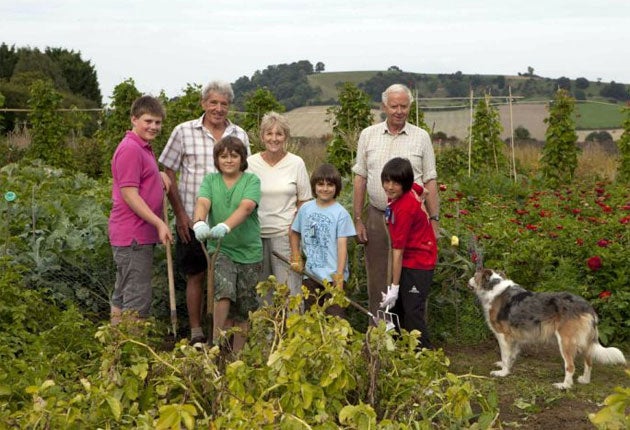Growing closer – gardening clubs root friendships
Just grab a spade to join this social networking site

Your support helps us to tell the story
From reproductive rights to climate change to Big Tech, The Independent is on the ground when the story is developing. Whether it's investigating the financials of Elon Musk's pro-Trump PAC or producing our latest documentary, 'The A Word', which shines a light on the American women fighting for reproductive rights, we know how important it is to parse out the facts from the messaging.
At such a critical moment in US history, we need reporters on the ground. Your donation allows us to keep sending journalists to speak to both sides of the story.
The Independent is trusted by Americans across the entire political spectrum. And unlike many other quality news outlets, we choose not to lock Americans out of our reporting and analysis with paywalls. We believe quality journalism should be available to everyone, paid for by those who can afford it.
Your support makes all the difference.A growing number of gardeners are building their lives around their hobby, using the pretext of swapping gardening tips as a plausible excuse for a night out, says the Royal Horticultural Society (RHS).
Almost as many people join gardening clubs for the social get-togethers – 68 per cent – as the 70 per cent that cite learning about cultivation, according to a new survey from the RHS. Hundreds of gardening clubs and allotment societies have affiliated to the RHS since 2009, with a rise of more than 10 per cent, from 2,800 in 2009 to 3,100 today. And half of gardening clubs have seen an increase in membership in the past year, according to the charity. Almost a quarter of a million Britons now belong to some form of gardening club, in a boom that is a much motivated by a desire to socialise as it is by a wish to grow their own or, as the artist Francis Bacon put it, pursuing the "purest of human pleasures".
September is traditionally a busy time in the gardening calendar, tidying up after the summer, pruning, harvesting vegetables and planting spring flowering bulbs. But while the growing season is coming to an end, with just a couple of weeks left, the popularity of gardening clubs is continuing to grow.
And it's not only people of a certain age squaring up to one another over the size of their marrows. The traditional gardening club of years gone by, largely the preserve of retired middle-class folk, is changing. Almost a third of members are aged between 40 and 60.
Stephanie Eynon, the Royal Horticultural Society's community horticulture manager, said: "I know it all sounds a bit like an advert for a dating agency, but gardening clubs really do offer excellent social benefits – monthly meetings, day trips out, annual events and even holidays abroad."
Another reason for the surge in popularity is the drive by cash-strapped Britons to save money by growing their own, she added: "Increasing numbers of people have been joining gardening clubs and allotment societies since the economic downturn. This appears to be a cyclical trend, with the number of gardening clubs peaking in the decade after the Second World War and during the financial gloom of the 1970s. People turn to gardening for something certain and sustainable in life, and to grow food to save money when times are difficult."
One of the new breed of people using gardening clubs as an excuse to socialise is Lou Johnson, a 44-year-old former fashion designer who wanted to "pursue this hobby in a way that was sociable and fun", and so she set up a club when she returned to her home village of Blunsdon in Wiltshire. "Everyone is knowledgeable about different aspects of gardening, but nobody takes it too seriously," she said.
And 41-year-old Teresa Strange, a married mother of two who helped set up the Melksham Gardeners' Society three years ago, said: "We go on picnics, meet for drinks and nibbles and visit gardens as a group ... people use the group as a social thing and a way to make new friends. You don't even need to have a garden to come along. I think it is part of a bigger trend, with more people using gardening as a means to socialise."
Like those joining arts and crafts societies, knitting circles and book clubs, people are using gardening as an excuse to get together as part of a wider trend in multitasking in their increasingly scare spare time, according to Dr Almuth McDowall, a psychology lecturer at the University of Surrey.
"People are increasingly choosing to multitask with the small amount of free time they have, linking social activities to other tasks," she said.
Anne Metcalfe, 66
Anne, co-founder of Mickleton Young Gardeners in Gloucestershire
"We began with eight children and one third of an allotment. Today, we have more than 22 children coming each week to help cultivate two full allotments. We are a gardening club primarily focused on helping children to experience growing their own produce. At first, the club caused anxiety among the older generation at the allotment, worried by the prospect of children trampling everywhere, but in time they have now come on board. Today, we are a very active club, meeting once a week. We try and make the club fun, making scarecrows, having Easter egg hunts, and at the end of the season carving pumpkins, organising a big bonfire and a barbecue."
Join our commenting forum
Join thought-provoking conversations, follow other Independent readers and see their replies
Comments